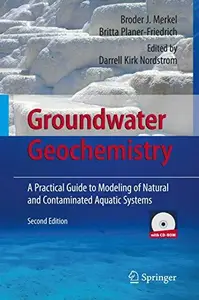- Témaindító
- #1
- Csatlakozás
- 2024.09.10.
- Üzenetek
- 25,854
- Reakció pontszám
- 8
- Díjak
- 5
- Kor
- 37

Free Download Groundwater Geochemistry: A Practical Guide to Modeling of Natural and Contaminated Aquatic Systems By Broder J. Merkel, Britta Planer-Friedrich (auth.), Darrell K. Nordstrom (eds.)
2008 | 230 Pages | ISBN: 3540746676 | PDF | 5 MB
To understand hydrochemistry and to analyze natural as well as man-made impacts on aquatic systems, hydrogeochemical models have been used since the 1960's and more frequently in recent times. Numerical groundwater flow, transport, and geochemical models are important tools besides classical deterministic and analytical approaches. Solving complex linear or non-linear systems of equations, commonly with hundreds of unknown parameters, is a routine task for a PC. Modeling hydrogeochemical processes requires a detailed and accurate water analysis, as well as thermodynamic and kinetic data as input. Thermodynamic data, such as complex formation constants and solubility-products, are often provided as databases within the respective programs. However, the description of surface-controlled reactions (sorption, cation exchange, surface complexation) and kinetically controlled reactions requires additional input data. Unlike groundwater flow and transport models, thermodynamic models, in principal, do not need any calibration. However, considering surface-controlled or kinetically controlled reaction models might be subject to calibration. Typical problems for the application of geochemical models are: * speciation * determination of saturation indices * adjustment of equilibria/disequilibria for minerals or gases * mixing of different waters * modeling the effects of temperature * stoichiometric reactions (e.g. titration) * reactions with solids, fluids, and gaseous phases (in open and closed systems) * sorption (cation exchange, surface complexation) * inverse modeling * kinetically controlled reactions * reactive transport Hydrogeochemical models depend on the quality of the chemical analysis, the boundary conditions presumed by the program, theoretical concepts (e.g.
Buy Premium From My Links To Get Resumable Support,Max Speed & Support Me
Code:
⚠
A kód megtekintéséhez jelentkezz be.
Please log in to view the code.
